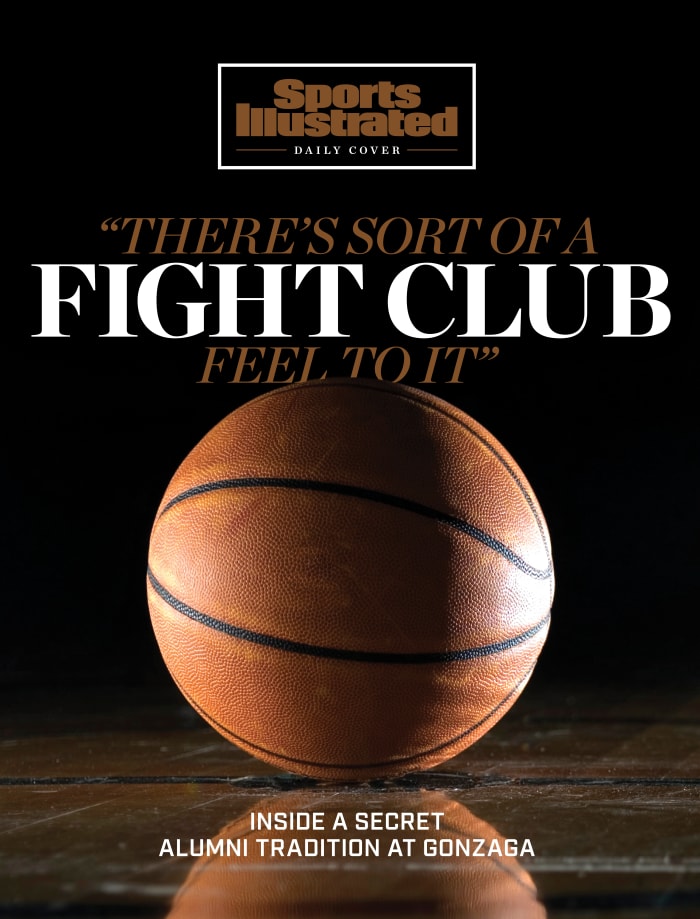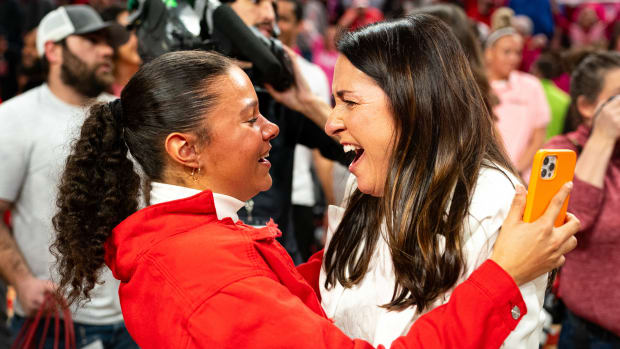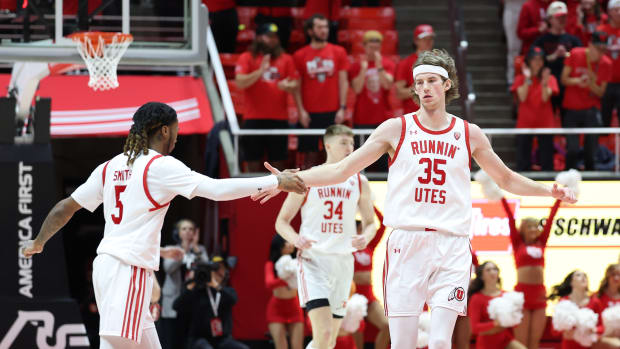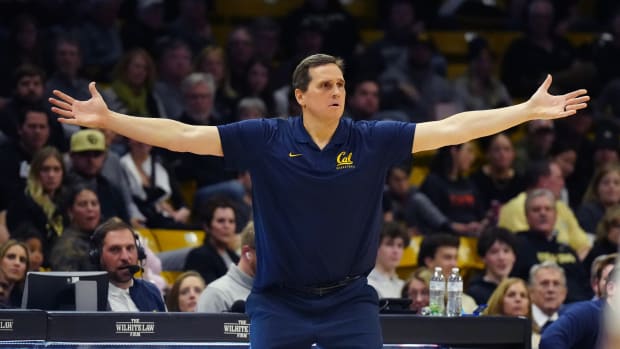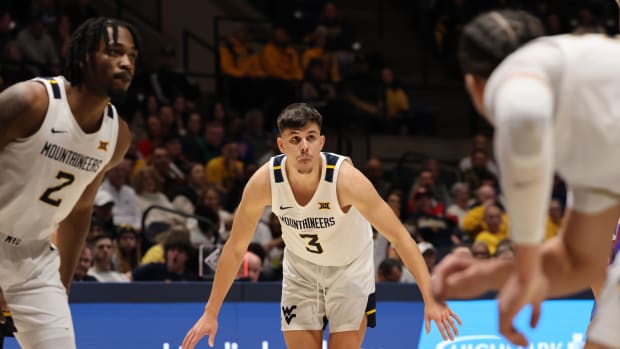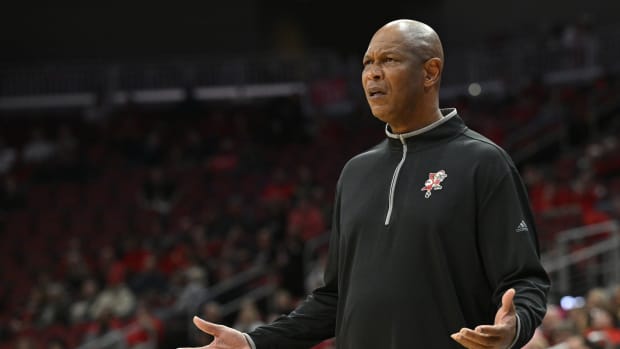The first rule* of Sunday Ball is to never speak publicly about Sunday Ball.
*That’s actually not a real rule, but it can feel that way to the pickup basketball participants in Spokane, Wash., those lucky few who can scratch, cajole or sneak their way onto a group text sent by a Hall of Famer for weekend games that often feature a dozen hoopers who played/play in the NBA.
Still, it’s a secretive enough space that many of the participants assume a wary tone when reached. “Who told you about John’s games?” asks Adam Morrison, the Gonzaga legend and infrequent Sunday Ball participant.
“John” would be John Stockton, the longtime and long-retired Jazz point guard, 10-time NBA All-Star and member of the league’s 50th anniversary all-time squad. On almost every Sunday morning, on holidays and birthdays, in snowstorms and through power outages, he can be found in the same place, with the same people, for the same purpose: basketball indoctrination, at the purest level of the sport, done mostly by former Zags.
The building is named The Warehouse Athletic Facility, and it’s a short drive from the campus of the top-ranked team in the men’s polls. Stockton bought the space and renovated it back in 2002, adding five basketball courts, six volleyball ones, an indoor baseball complex and a fitness/dance studio. But none of that defines The Warehouse quite like Sunday Ball, the nickname for Stockton’s invite-only games and perhaps the most exclusive—and important—informal run in college hoops. “There’s always been sort of a Fight Club–feel to it,” says Matt Santangelo (class of 2000 at Gonzaga), an off-and-on participant.
Stories abound and most involve Stockton (class of 1984) in one way or another. Like the time he and Winston Brooks (2003) argued over whether Stockton had been fouled in one meaningless game chock full of meaning. The action stopped, the debate intensified and, at one point, the Hall of Fame point guard yelled, “You guys are going to cheat us out of this game!” The courts fell silent, as teammates awkwardly looked at their sneakers, as if they were children watching an argument between two parents. Brooks admits to kicking the ball high in the air. Stockton? He retrieved the punt, tucked the ball underarm, turned off the lights in the gym—and left!
Most Sundays, says Mike Nilson (’00), are relatively tame in comparison. But once a month or so, the action heats up into a basketball boil. Nilson recalls one Sunday when he took an elbow to the nose, forcing blood to drip down his face. He rose slowly from the ground, red liquid pooling on the floor below. He believed he had a concussion. But while players on the other team asked whether he was O.K., Stockton took the ball and called a foul—on Nilson. Then he started to run down the court again. “He’s not even joking,” Nilson says. “He’s serious.”
There’s a point to all of this, of course, and this particular point travels all the way to the 2020–21 men’s NCAA tournament. It has long been inaccurate to describe Gonzaga’s men’s team as a mid-major, a Cinderella or anything other than an elite basketball force. And yet, the Bulldogs are a rare, if not the only, truly major program (in terms of resources) with the soul of a much smaller team—an ethos, a way of existence that is taught, reinforced and passed down from one generation of Zags to the next. That happens, in part, through Sunday Ball and the network of alumni who live in or return to the city known as Hooptown USA, their group led by the most-intense point guard who never forgot his roots.
More on Gonzaga Basketball
* How Mondays Have Become the Key to Gonzaga's Success
* Inside the Way Mark Few Built the Gonzaga Program
* The Gonzaga Train Rolls On With a Flourish
Gonzaga’s current rotation, for instance, features a local forward, Anton Watson, who started playing in these games years ago while starring for the AAU team that Stockton coached. When he showed up at The Warehouse, Stockton made sure to introduce Watson to the veterans, describing Watson as a “great kid who works really hard.” Those same veterans began pulling Watson to the side, offering tips and helping him to become a significant reserve contributor (7.5 points per game, 3.5 rebounds) for an undefeated team this season.
Current players do not play Sunday Ball during the season, to avoid injury in most years and also a global pandemic in this one. Some don’t ever join. But all know and lean on the alumni network, and the seeds for Gonzaga’s rise are sown right there, on those Stockton-bought and Stockton-swept and Stockton-controlled courts. All participants learn the history of the private game. They’ll hear Stockton tell stories about Magic Johnson and Larry Bird and playing against Michael Jordan in the NBA Finals. They’ll hear Zags tell tales of one glorious run after another. And, for those who arrive early enough, they’ll see one of the best players to ever dribble a basketball jogging up and down the courts, wearing those same purple Nikes from his Utah Jazz days, broom in hand, making sure even the floors meet his exacting standards.
“It’s a relational experience for those guys,” says Travis Knight, the team’s performance coach. “It reinforces the tradition.”
The Origin
Nilson met Stockton something like 20 years ago. The men bonded over basketball, becoming friends, until one day, Nilson received the group text equivalent of a golden ticket. Stockton became a mentor after that, offering supplement advice, calling to check on Sunday Ball injuries, inquiring about Nilson’s children and new job as the strength coach for the Gonzaga women’s basketball team. Over winter break earlier this year, Nilson needed open-heart surgery to correct a faulty valve. Stockton called regularly while his friend recovered, and they’d talk about family, COVID-19, social injustice—the works. And then one day, totally unexpectedly, Stockton asked Nilson whether the trainer wanted the Hall of Famer to be a guest on his podcast, Hoop Commitment. “I don’t know if he just had a moment of weakness, because of the surgery,” Nilson says. “But I was shocked.”
Stockton did make an appearance and, for 25 minutes or so, he explained for the first time publicly how the phenomenon known as Sunday Ball came to exist. The guard traced the roots to his childhood, when an influential coach would knock on his door every weekend and ask him to come outside for pickup games. Playing against older children made him better, more competitive, Stockton said, and so he regularly answered the knock for years.
After his college and NBA (2003) careers ended, Stockton returned, like so many ex-Gonzaga players, to Spokane, a city of more than 217,000 near the Washington-Idaho border. Realizing that he desired to “reinsert [himself] in the athletic lives” of his children, Stockton told Nilson he came up with Sunday Ball wanting to do for them what his coach had done for him. He called old friends like Brooks and Nilson to see whether they wanted to play regularly, and he meant almost every week. “We rival the post office for consistency over time,” Santangelo quips.
“Doesn’t matter if it’s your wife’s birthday,” Brooks says.
Nilson wanted to know what Stockton expected from his invitees.
“Should I play hard?” he asked.
“Mike,” Stockton responded, as if Nilson should have known the answer, “just compete.”
“Which means everyone in Sunday Ball plays like it’s the NBA Finals or the national championship,” Nilson says now.
The Rules
For Sunday ballers, there’s no formal list of regulations but rather expectations that never change. No exceptions. Not on Stockton’s watch.
First, only Stockton can invite someone in. Other players can suggest new members, but they need to go through Stockton first. The vast majority of Sunday Ball’s 25–40 regular participants—estimates vary widely—at least played college ball nearby, whether at Gonzaga, Eastern Washington or Whitworth. As many as half of those players spent some time playing pro ball, too. Like Morrison, Dan Dickau, Robert Sacre and Kelly Olynyk. When NBA types fill the gym in the summer, after the Finals, several more mortal players say the intensity ramps up. Except for Stockton, a player who never needed any ramping.
They’re sometimes joined in the college basketball offseason by current Zags being immersed in the style of a program. Participation is not required, nor even encouraged, necessarily. The players, like all Sunday ballers, must want to take part. Stockton’s children also play, along with some of his relatives, and the children of other non-member-wink-wink Sunday Ball members.
Games are full-court, even 3-on-3 ones, and they’re mostly 5-on-5. First team to seven wins, and three-pointers count the same as jumpers in the post, to encourage ball movement, better shot selection and less set-up-behind-the-arc-to-rain-triples play. Winners remain. Losers sit. The sessions generally last 90 minutes but can go longer. Offensive players call fouls.
Also: There’s no audience. Stockton does not allow parents to watch Sunday Ball, keeping the same rule from his time as an AAU basketball coach. If parents show up, anyway, hoping to bask in the exclusivity of a Sunday Morning, Stockton politely asks them to leave. Imagine that: getting booted from a gym for an informal hoops game by a Hall of Famer. And this even goes for parents of older players, grown men with gray hair who must abide by the same regulations. Stockton even, according to Sunday Ball legend, once quieted players waiting for the next game who had the temerity to … clap.
Beyond the invites for “anybody who’s not a [basketball] moron,” Morrison says—his bar for basketball proficiency is higher than most—Stockton also sometimes asks elite high school players to join. But for any prospects, no matter the age, acclaim or experience, there’s also an indoctrination period. Most show up the first time and aren’t allowed to play and that happens over and over for weeks; Santangelo says it’s usually around three weeks but sometimes over a month before they’re asked to join an actual game. Stockton wants them, Santangelo says, to “earn their stripes.”
To Brooks, that actually marks the first unwritten rule of Sunday Ball: Pay your dues up front. (Fight Club sounds better, but alas, the dues deal is the truth.)
All of the informal Sunday Ball policies point toward a larger goal: that Stockton wants to pass down or reinforce a specific style of basketball, a way to respect the game and learn from the opposition, free of interference, divas or too many prying eyes. Stockton expects participants to know how to set hard screens, to box out, play defense (or try hard to), space correctly, make cuts efficiently, dive for loose balls, scratch for boards. He wants the fundamentals, not the flash. “The way he [has] always played, more or less,” Dickau says. If someone doesn’t play with enough intensity for his liking, which happens rarely, Stockton has been known to ask people to leave.
Sometimes, participants elect to take their own breaks. “Oh, my gosh, sometimes I’ll go down there, and I’ll be so angry and embarrassed at myself for getting so angry, that I’ll say, I’m not going back,” Santangelo says. “I have to ask myself: Why am I going down there every Sunday to play basketball with people if I’m just going to fight with them?” Still, a certain regular level of involvement is more or less required. Whenever Dickau and Santangelo stop attending for different stretches, they notice that they get dropped from the group text chain and have to humbly ask back in. (Stockton usually smiles and obliges, they say, leading his friend Brooks to clarify that while the former Jazz guard may seem a little, ahem, demanding, Stockton is actually “one of the coolest people you’d ever meet.”)
Dickau is both a fan of Stockton (“one of my idols”) and a guard skilled enough to have played six NBA seasons. Sunday Ball, he says, “is pure basketball, the kind where nothing matters except the game.” Sometimes Morrison drops by just to watch, a perk for a legend who can then form a one-person crowd.
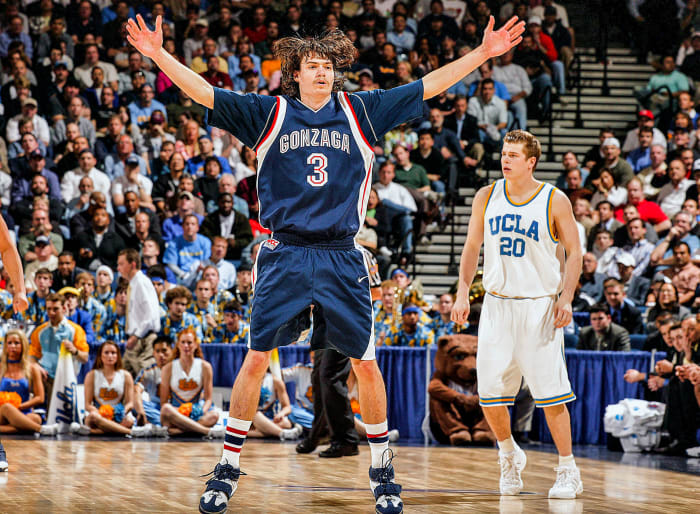
Morrison is a Gonzaga legend and an infrequent Sunday Ball participant.
John W. McDonough/Sports Illustrated
The Ties
Santangelo missed the beginning of Sunday Ball. But upon moving back to Spokane in 2006, he noticed how much the exclusive, informal game had become a centerpiece that bound the graduated Zags to younger players. The fans who could no longer afford season tickets, or who spent years on the waiting list, had no idea what the tradition the school espoused actually meant—and how much Sunday Ball buttressed a way of hoops that was fading elsewhere without such emphasis. “It’s about tradition,” Santangelo says, and when asked a follow-up about whether tradition defined a place like Gonzaga, he said yes, without hesitation.
About that brotherhood: Nilson recalls the season that the Bulldogs advanced to the national title game against North Carolina in 2017. Something like 40 former players descended on Arizona to see whether the Zags could win the championship that had long eluded them. Most of the players who traveled there, like Stockton, were regular Sunday Ball participants, and thus they knew the key players on that Gonzaga team.
The older players waited outside a team meeting the night before the semifinal against South Carolina, expecting to meet briefly with Mark Few. Instead, the door to the room opened, and a giant projection screen unspooled decades’ worth of highlights, many made by the men inching into the team’s space. The current Zags stood up and showered their predecessors with a standing ovation. The room might have gotten a little dusty at that point, according to several who stood inside.
As the Bulldogs now attempt to complete the first “perfect” men’s college basketball season since 1975–76, the former Zags continue to play the same game on Sundays and sometimes on other days of the week. Before tips, between them or afterward, they’ll sometimes discuss the current team and any ways they could help or whether these Zags really can go undefeated (consensus: yes). Those who don’t travel to Indianapolis for the Final Four, should Gonzaga advance, will also play Sunday Ball between the national semifinals and the title tilt.
Most, anyway. The current Zags were such a joy to watch that they inspired Santangelo to return to Sunday Ball recently. Of course, now 43, it took him one morning of full-speed exercise to injure a knee. He went on the injured list and then recovered and, regardless, remained invested in Gonzaga’s title push—one that wouldn’t have been possible without Sundays defined by bloody noses, hard fouls and the Hall of Famer who both sweeps the floors and helps to sustain a college basketball program with an unparalleled and exclusive tradition.
